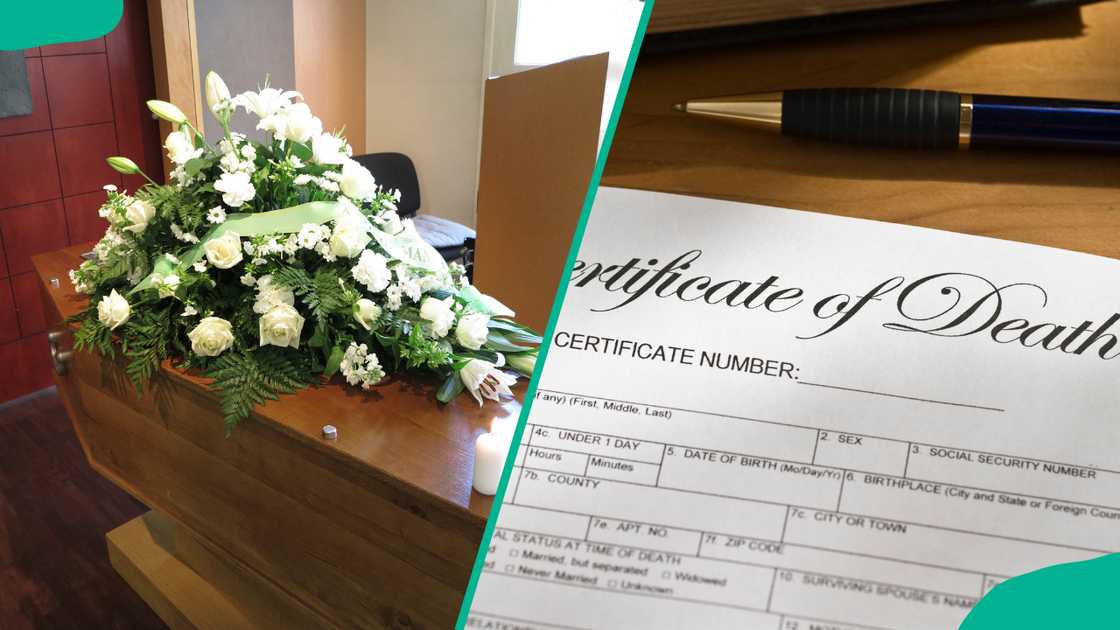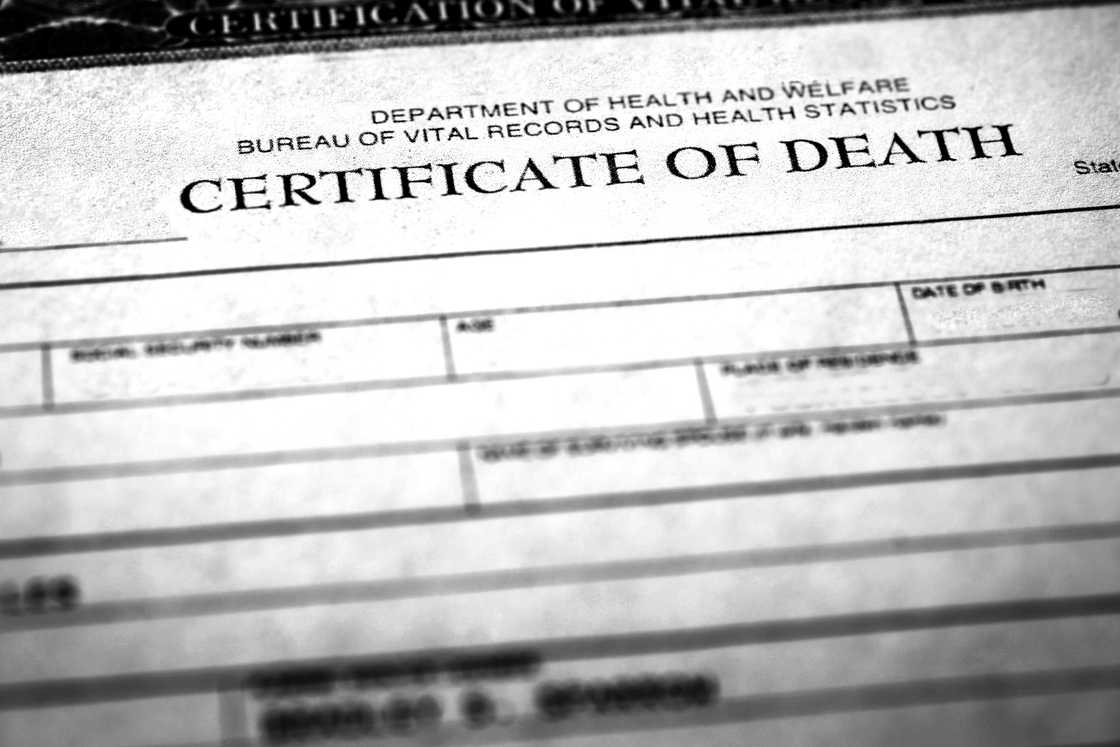National Population Commission death certificate obtaining process
When someone passes away, registering their death and obtaining an official death certificate is a critical process often overlooked. This guide will help you understand the National Population Commission death certificate obtaining process in Nigeria to help you process documents for your lost loved ones.

Source: UGC
TABLE OF CONTENTS
- Key takeaways
- National Population Commission death certificate obtaining process
- Where to get a death certificate in Nigeria?
- Exceptional cases when a death certificate cannot be obtained
- What is the easiest way to get a death certificate?
- What is the proof of death in Nigeria?
- How much does it cost to get a death certificate in Nigeria?
- What documents do you need to apply for a death certificate?
Key takeaways
- The National Population Commission is responsible for registering all deaths and births in Nigeria and issuing official certificates.
- Obtaining an NPC death certificate is generally free if done within the prescribed period, but a medical certificate required may incur charges.
- Death must be registered at the NPC office nearest to the location where it occurred, ideally within 7 days.
- A blood relative is usually required to apply for the death certificate, providing the necessary proofs and documents.
- Late registrations (after 30 days) incur a fee; registrations after 12 months require special permission.
- Death certificates cannot be issued in cases involving suspicious deaths, police investigations, or when families refuse an autopsy.
National Population Commission death certificate obtaining process
The National Population Commission (NPC) is Nigeria's official government body registering births and deaths nationwide.
The national death certificate issued by the NPC is a legal document that records the death and provides crucial data for government records, public health policies, and inheritance claims. The National Population Commission death certificate sample is recognised as valid indefinitely.
Step-by-step guide
Losing a loved one is never easy, and handling the legal requirements that follow can be overwhelming. Here are the key requirements and steps on how to obtain a death certificate from the National Population Commission in Nigeria as of 2025.
- The death must be registered by an NPC official in the location where it occurred.
- The applicant must be a blood relative of the deceased and provide proof of death.
- The death should be reported at the nearest NPC office within 7 days.
- Death reported between 30 days and 12 months after death is subject to a fee.
- Death reported after 12 months requires written permission from the Deputy Chief Registrar.

Source: Getty Images
Once you have met all the above requirements, follow the steps below to obtain a death certificate in Nigeria:
1. Obtain a medical death certificate
If the death occurred in a medical facility, obtain a certificate from the hospital. For deaths outside medical facilities, apply to medical officers for a certificate.
2. Submit documents to NPC
Take the medical certificate and required documents to the nearest NPC office.
3. Provide necessary information
- Your application form and identification
- Full name of the deceased
- Birthplace and birth date of the deceased
- Age, gender, and marital status at death
- Place and cause of death
- Details of spouse and children (especially dependents)
- Proof of relationship (blood relative)
- Copies of the deceased's identification and the medical death certificate
Once verified, the NPC will issue the National Population Commission death certificate.
Where to get a death certificate in Nigeria?
You can get a death certificate in Nigeria in 2025 at any National Population Commission office nearest to where the death occurred. Many state capitals have NPC offices, and some states provide partial services online.
For convenience, you may also explore how to get a death certificate online through official state portals or the NPC website, where available.
Exceptional cases when a death certificate cannot be obtained
NPC death certificates are not issued:
- If the death occurred under suspicious circumstances.
- If the deceased is part of an ongoing police investigation.
- If the family refuses to allow an autopsy.
- If the deceased died under government custody as a criminal, and the body has not been released.
- In some rare cases, a spouse (not a blood relative) or an appointed representative can apply for the death certificate if no blood relatives are alive or able to use it.

Source: UGC
What is the easiest way to get a death certificate?
The easiest way is to promptly register the death at the nearest NPC office with all required documentation within 7 days of death. This avoids additional fees and complicated approvals.
What is the proof of death in Nigeria?
The main proof of death in Nigeria is the medical death certificate issued by a hospital or authorised medical officers. This certificate is mandatory before the NPC can issue the national death certificate.
How much does it cost to get a death certificate in Nigeria?
The NPC does not charge for the death certificate if the registration is timely. However, certificates issued by medical facilities (needed to obtain the NPC certificate) may have variable costs.
What documents do you need to apply for a death certificate?
Application form, your ID, proof of relationship, deceased's ID copies, medical death certificate, and details about the deceased.
Understanding the National Population Commission death certificate obtaining process in Nigeria 2025 is essential for ensuring the proper registration of death and acquiring a valid national death certificate. Timely registration simplifies the process, helps avoid fees, and ensures the deceased's records are properly documented.
DISCLAIMER: This article is not sponsored by any third party. It is intended for general informational purposes only and does not address individual circumstances. It is not a substitute for professional advice or help and should not be relied on to make decisions of any kind. Any action you take upon the information presented in this article is strictly at your own risk and responsibility!
Legit.ng recently published an article on essential documents for proving ownership of a house or land. The guide highlights the importance of title deeds, certificates of occupancy, and other vital paperwork, along with steps to obtain them.
Understanding these documents is crucial for securing property rights and avoiding legal disputes. Whether you're a new homeowner or looking to verify ownership, this article provides valuable insights into the process.
Source: Legit.ng

Adrianna Simwa (Lifestyle writer) Adrianna Simwa is a content writer at Legit.ng where she has worked since mid-2022. She has written for many periodicals on a variety of subjects, including news, celebrities, and lifestyle, for more than three years. She has worked for The Hoth, The Standard Group and Triple P Media. Adrianna graduated from Nairobi University with a Bachelor of Fine Arts (BFA) in 2020. In 2023, Simwa finished the AFP course on Digital Investigation Techniques. You can reach her through her email: adriannasimwa@gmail.com

John Ouma (Lifestyle writer) John Ouma is a journalist with six years of experience. He has published sharply argued think pieces that live at the intersection of power, politics, and society. He was awarded the FirstGen scholarship by Biola University and a merit-based scholarship by AMDA College and Conservatory of the Performing Arts in January 2021. He has worked for The Standard and Nation Africa as an opinion columnist between 2018 and 2022. He is currently working on his first novel—a literary fiction that traces the life of a contemporary Kenyan artist. Email: gervasjohn97@gmail.com

